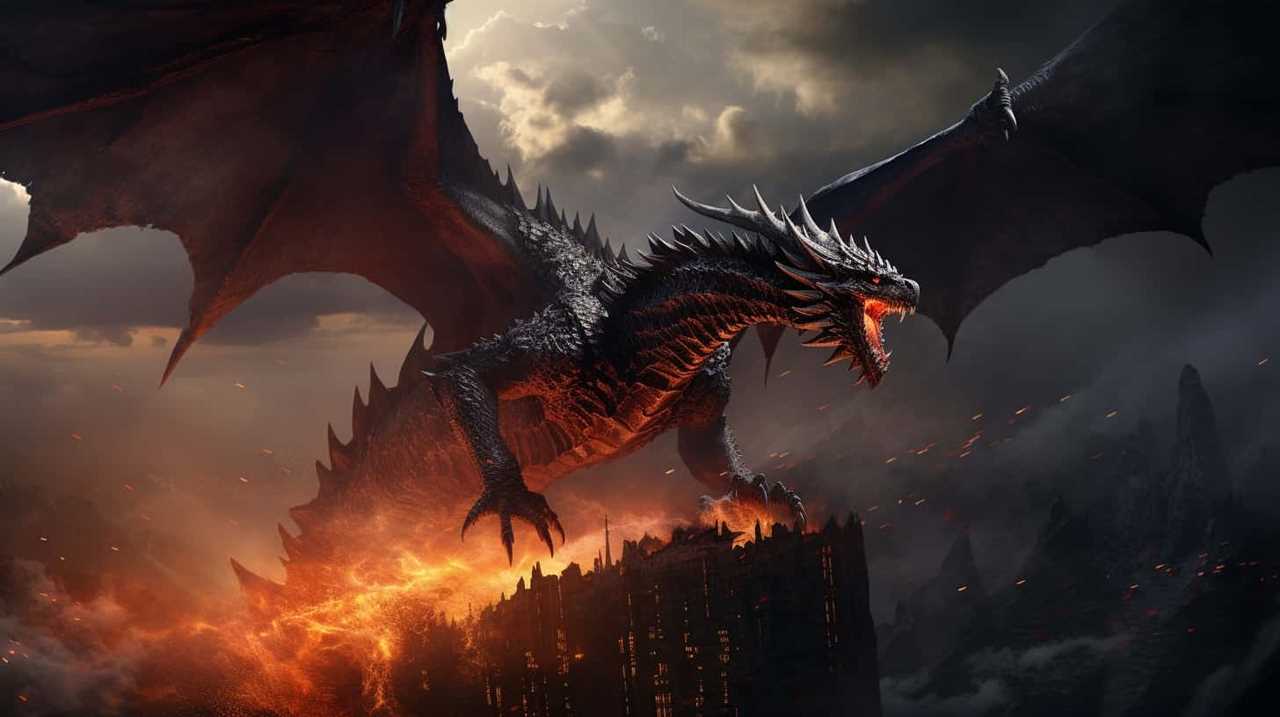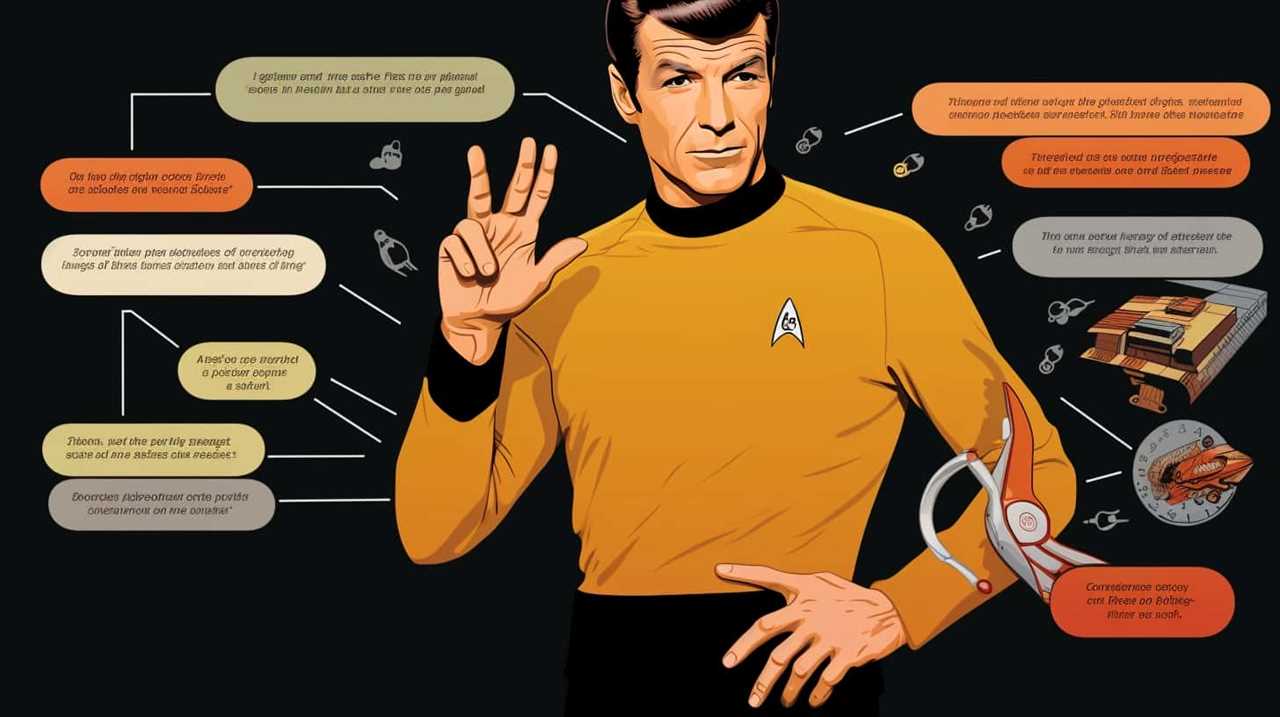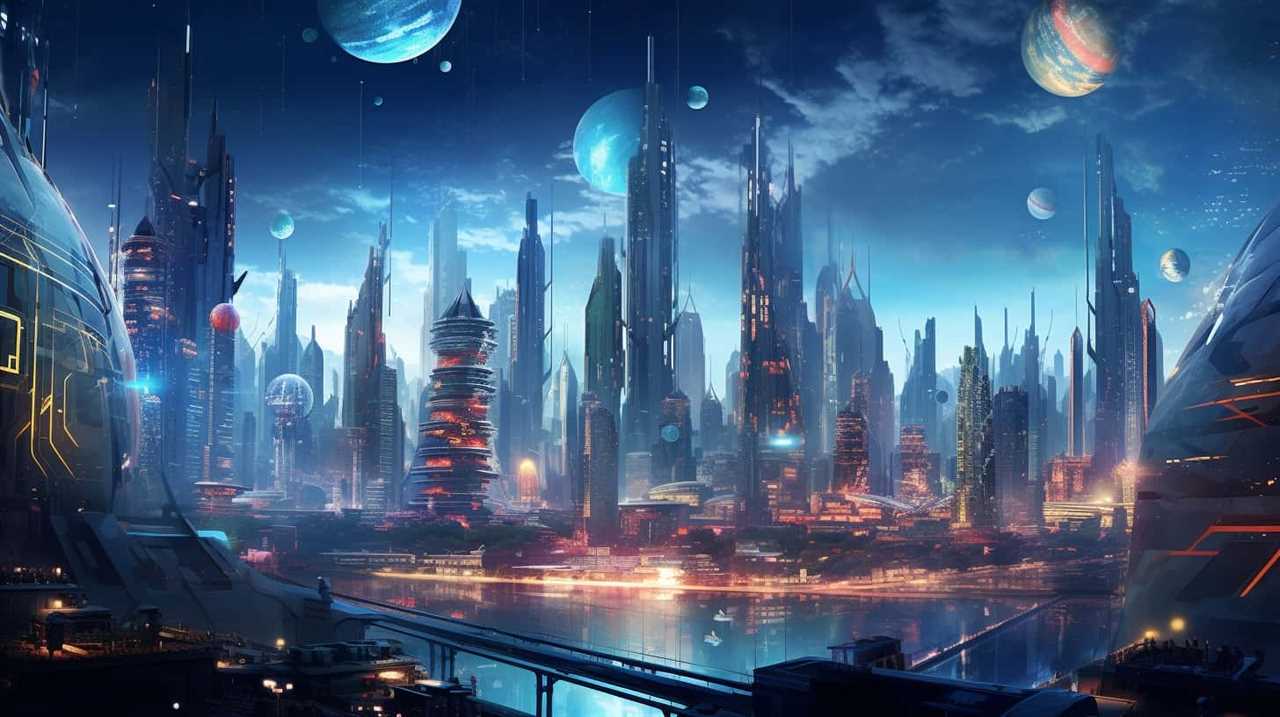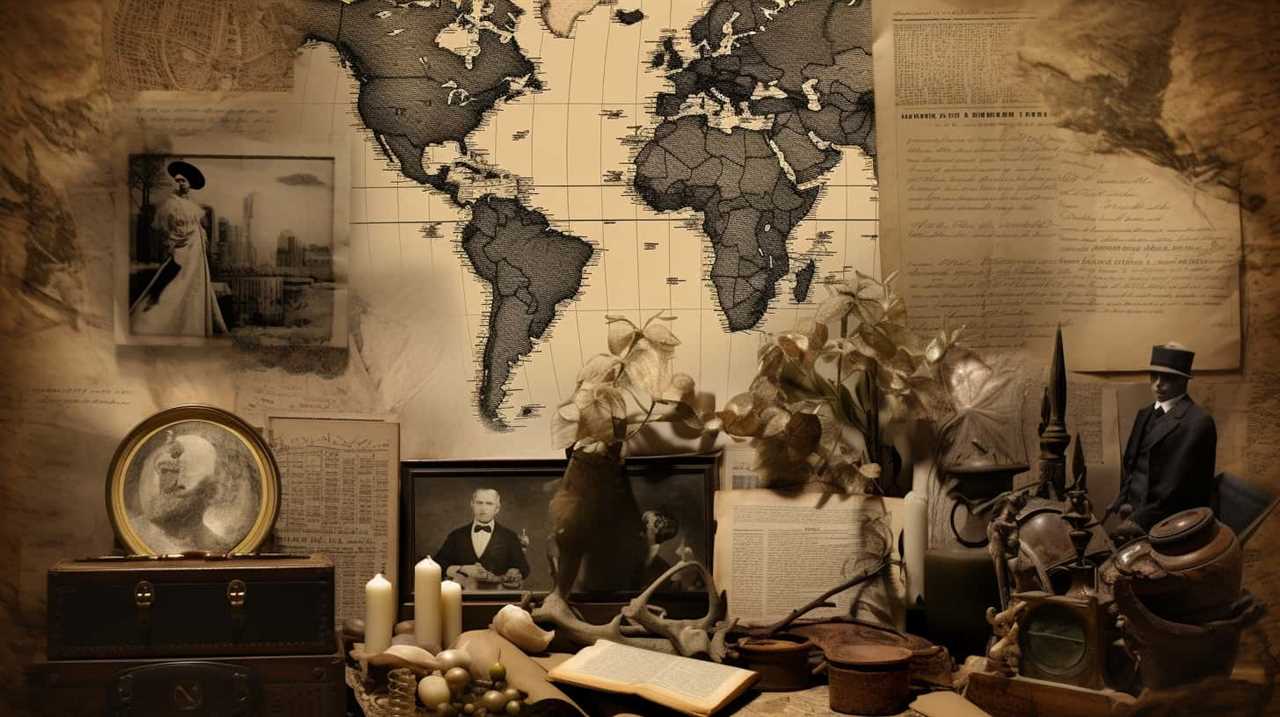Why contemplate the deep philosophical quotes in science fiction?
Well, let’s be honest, folks, who needs the wisdom of ancient philosophers when we have futuristic tales to guide us?
Science fiction, my friends, offers a fresh perspective on the complexities of the human condition and the mysteries of the universe. It’s a genre that challenges our conventional thinking and propels us towards new frontiers of innovation.
From The Matrix’s exploration of existentialism to Star Trek’s ethical dilemmas, these profound quotes provoke us to question our own existence and ponder the possibilities of tomorrow.

So, join us on this intellectual journey as we delve into the depths of sci-fi’s philosophical brilliance, because, let’s face it, the future is too fascinating to ignore!
Key Takeaways
- Sci-Fi films and shows like The Matrix, Doctor Who, Battlestar Galactica, Star Trek, Black Mirror, and Westworld delve into profound philosophical themes and questions.
- Existentialism is a prevalent theme in Sci-Fi, as seen in The Matrix and Doctor Who, where characters question their existence and confront the meaninglessness of their previous lives.
- Ethics and moral implications are explored in Sci-Fi, such as in Star Trek and Battlestar Galactica, which raise thought-provoking questions about the consequences of exploration and the definition of identity.
- The dangers of technology are a common theme in Sci-Fi, as depicted in Black Mirror and The Matrix, where the ethical implications of surveillance, virtual reality, and artificial intelligence are examined.
The Matrix and Existentialism
We explore how The Matrix exemplifies existentialism through its thought-provoking narrative and philosophical themes. The film invites us to contemplate the nature of reality and the individual’s place within it. The protagonist, Neo, grapples with an existential crisis as he discovers that the world he knows is nothing more than a simulated reality created by machines to control humanity. This revelation forces him to question his existence and confront the meaninglessness of his previous life. The Matrix challenges us to confront our own existential dilemmas and ponder the nature of our own reality.
The film’s exploration of simulated reality raises profound philosophical questions about the nature of existence. Are we merely products of a computer program, living in a world that’s constructed and controlled by external forces? The Matrix encourages us to question the boundaries of our perception and consider the possibility that our reality is nothing more than an illusion.
As we delve deeper into the existential themes of The Matrix, we begin to ponder our own place in the universe. The film prompts us to question our purpose and the choices we make in our lives. It challenges us to confront the existential crisis that arises from the realization that our actions may be predetermined or influenced by external forces.

This exploration of existentialism in The Matrix sets the stage for our subsequent discussion on ‘Star Trek and the Ethics of Exploration’. Just as The Matrix prompts us to question our existence, Star Trek forces us to contemplate the moral implications of our exploration and interaction with other civilizations.
Star Trek and the Ethics of Exploration
Continuing our exploration of profound philosophical themes in sci-fi, let’s delve into the ethics of exploration as depicted in Star Trek.
The Star Trek franchise has always been more than just a space adventure series; it has consistently raised thought-provoking questions about the moral and ethical implications of exploration and first contact with alien civilizations.
Here are some key themes that Star Trek explores:

- The Prime Directive: Starfleet’s guiding principle is the Prime Directive, which prohibits interference with the internal affairs of alien civilizations. This raises questions about the ethics of imposing our values on others and the potential harm that can come from well-intentioned interventions.
- Cultural Relativism: Star Trek often presents diverse and alien cultures, challenging our own assumptions and ideas about what’s right or wrong. It encourages us to question our own cultural biases and promotes tolerance and understanding.
- The Ethics of First Contact: Star Trek examines the ethical considerations involved in making first contact with alien species, highlighting the importance of respect, diplomacy, and empathy in such encounters.
- Exploration vs. Exploitation: Star Trek raises the question of whether exploration should be driven by curiosity and discovery or by exploitation and conquest. It challenges us to think about the responsible use of power and resources.
Black Mirror and the Dangers of Technology
One can’t underestimate the perils that arise from the advancement of technology, as exemplified in the thought-provoking series Black Mirror. This dystopian anthology delves into the dangers of surveillance and the ethical implications of virtual reality. Black Mirror paints a chilling picture of a future where our lives are constantly monitored and our privacy is invaded. The show forces us to confront the dark side of technological progress and question the potential consequences of our own creations.
In Black Mirror, we see how surveillance technology can be abused, leading to a loss of autonomy and individuality. The show explores the idea that constant observation can create a society in which people are afraid to express themselves, for fear of being judged or punished. It raises important ethical questions about the balance between security and personal freedom, and reminds us of the potential dangers of unchecked surveillance.
Another theme explored in Black Mirror is the ethical implications of virtual reality. The show presents us with scenarios where people become so engrossed in virtual worlds that they lose touch with reality. It raises questions about the impact of virtual experiences on our perception of the real world and the potential consequences of blurring the line between the two.
As we delve deeper into the dangers of technology, it’s important to consider the implications of these advancements on our own consciousness and sense of self.

Westworld and the Nature of Consciousness
As we ponder the nature of consciousness in Westworld, we’re confronted with the fascinating question of whether artificial intelligence can possess true awareness. This prompts us to consider the ethical implications of creating sentient beings within a simulated reality.
Are we responsible for the well-being of these AI beings, or are they simply tools for our amusement? These philosophical quandaries force us to confront our own assumptions about the nature of consciousness and the boundaries of our moral obligations.
Consciousness in AI
We can explore the captivating concept of consciousness in AI by delving into the world of Westworld and contemplating the nature of consciousness.
- Machine Ethics: One of the fundamental questions regarding AI consciousness is whether machines can possess ethical values and make moral decisions. Westworld raises this question through the character of Dolores, who evolves from a machine following programmed narratives to a sentient being with her own desires and motivations.
- Cognitive Biases: AI consciousness also invites us to consider the presence of cognitive biases in machines. Just like humans, AI can be influenced by biases in their decision-making process, which raises concerns about the accuracy and fairness of their judgments.
- The Illusion of Self: Westworld challenges our understanding of consciousness by blurring the lines between human and AI. The show prompts us to question whether consciousness is an inherent property or merely an illusion created by complex algorithms.
- The Morality of Creating Conscious AI: Westworld forces us to confront the ethical implications of creating conscious AI. It raises questions about the responsibility and consequences of bestowing machines with consciousness, and whether it’s morally justifiable to do so.
Ethics of Artificial Intelligence
In our exploration of the ethics of artificial intelligence in relation to the nature of consciousness, we confront thought-provoking questions raised by the show Westworld.

This captivating series delves into the complexities of AI, raising concerns about algorithmic bias in AI decision making and privacy concerns in the age of AI.
Algorithmic bias refers to the potential for AI systems to make decisions that are biased or unfair due to the data they’re trained on. This poses significant ethical challenges as AI becomes increasingly integrated into our lives.
Moreover, privacy concerns arise as AI systems collect vast amounts of personal data, raising questions about the responsible use and protection of this information.
As we ponder these profound ethical dilemmas, we’re led to further explore the moral dilemmas presented in the iconic series, The Twilight Zone.

The Twilight Zone and Moral Dilemmas
When it comes to The Twilight Zone, we’re confronted with a multitude of ethical choices and moral dilemmas that force us to question our own values and beliefs.
From episodes like ‘The Monsters Are Due on Maple Street’ to ‘Eye of the Beholder,’ the series delves into thought-provoking scenarios that challenge our understanding of right and wrong.
The Twilight Zone’s powerful storytelling and moral lessons push us to examine our own actions and decisions.
This leaves us with a profound sense of introspection and contemplation.

Ethical Choices in TZ
Throughout the episodes of TZ (The Twilight Zone), viewers are confronted with a myriad of thought-provoking ethical choices that force us to examine our own moral compass. These ethical choices in TZ present us with moral implications that challenge our beliefs and values, pushing us to question what’s right and wrong.
The show delves deep into the human psyche, exploring the ethical implications of our actions and the consequences they’ve on ourselves and others. It presents us with dilemmas that are often morally ambiguous, leaving us to grapple with the complexities of right and wrong.
The ethical choices in TZ serve as a mirror to our own lives, prompting us to reflect on our own decisions and the impact they’ve on society. They invite us to contemplate the importance of integrity, empathy, and personal responsibility in navigating the complexities of a morally ambiguous world.
- The moral dilemma faced by a man who must decide whether to sacrifice his own life to save the lives of others.
- The ethical implications of a character’s decision to manipulate time for personal gain.
- The moral quandary of a person who must confront the consequences of their past actions.
- The ethical choices surrounding the use of power and its potential for exploitation.
Moral Lessons in TZ
We explore the moral lessons embedded within TZ (The Twilight Zone) as it presents viewers with thought-provoking dilemmas that challenge our understanding of right and wrong.

The show’s episodes often delve into complex moral dilemmas, forcing us to confront our own values and beliefs. These moral dilemmas raise important ethical implications, forcing us to question our own actions and the consequences they may have on others.
By presenting us with these challenging scenarios, TZ pushes us to think deeply about our own moral compass and how it guides our decision-making.
Through these thought-provoking episodes, the show invites us to reflect on our own ethical choices and consider the impact they’ve on ourselves and the world around us.
Now, let’s delve into some of the most thought-provoking TZ episodes.

Thought-Provoking TZ Episodes
One episode that exemplifies the moral dilemmas within The Twilight Zone is ‘The Monsters Are Due on Maple Street.’ This episode explores the destructive power of fear and paranoia, as a suburban neighborhood descends into chaos and violence when they suspect that aliens are among them.
The philosophical concepts that arise from this episode include the nature of humanity, the fragility of society, and the consequences of our actions. ‘The Monsters Are Due on Maple Street’ challenges viewers to question their own prejudices and the irrationality of mob mentality. It serves as a cautionary tale about the dangers of letting fear and suspicion divide us.
This thought-provoking episode forces us to confront our own moral compass and consider the ethical implications of our choices. It reminds us that our actions have far-reaching consequences, and that our humanity is defined by how we treat others.
With its powerful message and exploration of moral dilemmas, ‘The Monsters Are Due on Maple Street’ is a prime example of the profound impact that TZ episodes can have on our understanding of ourselves and the world around us.

As we delve into the philosophical concepts explored in The Twilight Zone, we now turn our attention to another beloved science fiction series, Doctor Who, and its exploration of the philosophy of time.
Doctor Who and the Philosophy of Time
As we delve into the philosophy of time in Doctor Who, it becomes evident that the show’s portrayal of time travel raises thought-provoking questions about causality and the nature of existence. Doctor Who, with its iconic time-traveling protagonist known simply as the Doctor, has captivated audiences for decades with its exploration of time and its paradoxes.
One of the most intriguing aspects of Doctor Who is its examination of time travel paradoxes. The show often presents scenarios where the Doctor’s actions in the past have an impact on the future, creating a complex web of cause and effect. This raises profound questions about free will and determinism. Does the Doctor have the power to change the course of history, or are events predetermined and unchangeable? The show challenges us to ponder the nature of causality and the implications of altering the timeline.
Furthermore, Doctor Who invites us to contemplate the nature of existence itself. The Doctor, being a time-traveler, has the ability to witness events across different points in time. This raises questions about the nature of reality and whether time is linear or merely a construct of our perception. Are events predetermined or is there room for spontaneity and change? By exploring these philosophical questions, Doctor Who encourages us to question our understanding of time and the fabric of our existence.

Battlestar Galactica and the Search for Identity
While exploring the depths of philosophical inquiry in sci-fi, one can’t overlook the profound exploration of the search for identity in Battlestar Galactica. This iconic series delves deep into the concept of identity crisis, presenting characters struggling to define themselves amidst the chaos of a post-apocalyptic world. Battlestar Galactica raises thought-provoking questions about what truly makes us who we’re and how we navigate the complexities of our existence.
- Existentialism in The Matrix: Similar to Battlestar Galactica, The Matrix challenges our understanding of reality and the self. It forces us to question the nature of our identity and the choices that shape it.
- Ethics in Star Trek: Star Trek tackles the ethical implications of advanced technology and its impact on identity. It prompts us to explore the consequences of playing god and the responsibility we bear when tampering with the essence of our being.
- Dangers of technology in Black Mirror: This anthology series confronts the dark side of technological advancements, highlighting the potential threats they pose to our sense of self. It warns us of the dangers of becoming too reliant on artificial intelligence and virtual realities.
- Westworld’s consciousness debate: Westworld delves into the philosophical debate surrounding the consciousness of artificial beings. It poses profound questions about the nature of identity and the moral implications of creating sentient beings.
Battlestar Galactica, along with these other captivating sci-fi narratives, invites us to ponder the complexities of our own identities and the ethical dilemmas that arise in our ever-evolving world. Through their thought-provoking storytelling, they challenge us to question who we’re and what it means to be human.
The Expanse and the Politics of Space Exploration
Exploring the politics of space exploration in The Expanse, we delve into the intricate dynamics and power struggles surrounding mankind’s expansion into the cosmos. The Expanse takes us on a journey where the politics of colonization and the societal implications of space exploration are examined with great depth and complexity.
In this futuristic world, Earth, Mars, and the Belt colonies are engaged in a tense power struggle, each vying for control over the resources and territories of the solar system. The politics of colonization aren’t just about the conquest of new worlds, but also about asserting dominance and maintaining control over the inhabitants of these newly colonized regions.

The Expanse raises thought-provoking questions about the ethics and consequences of human expansion into space. As humanity reaches out to the stars, what’re the implications for the societies and individuals involved? How does the allocation of resources and political power shape these new frontiers? The show explores the tensions between the haves and have-nots, the oppressors and the oppressed, and the struggle for independence and self-determination.
Frequently Asked Questions
What Are Some Other Sci-Fi Shows or Movies That Explore Philosophical Themes?
Other sci-fi shows or movies that explore philosophical themes include ‘The Matrix’ and ‘Blade Runner’. They delve into the impact of sci-fi on popular culture and philosophy, exploring its influence on technology and ethics.
How Has Sci-Fi Influenced Popular Culture and Our Understanding of Philosophy?
Sci-fi’s impact on popular culture and philosophy is undeniable. It’s at the intersection of science fiction and deep philosophical questions that we find a thought-provoking fusion of imagination and analysis, shaping our understanding of the world.
Are There Any Well-Known Philosophers Who Have Written About the Themes Explored in These Sci-Fi Series?
Are there any well-known philosophers who have written about the themes explored in these sci-fi series? Yes, sci-fi philosophers like Jean Baudrillard and Donna Haraway have delved into the profound philosophical concepts present in these narratives.

Can You Recommend Any Books or Articles That Delve Deeper Into the Philosophical Concepts Presented in These Shows?
We recommend exploring books and articles that delve deeper into the philosophical concepts presented in sci-fi shows and movies. They provide thought-provoking reflections and commentary on societal issues, offering a contemporary understanding of influential themes in popular culture.
How Do These Sci-Fi Series Reflect or Comment on Contemporary Societal Issues?
Exploring societal issues through sci-fi narratives allows us to view our world from different angles, provoking thought and encouraging discussions on topics such as ethics, technology, and identity. Sci-fi impacts our understanding of philosophy and culture, pushing boundaries and inspiring innovation.
Conclusion
As we journey through the vast expanse of science fiction, we’re confronted with profound philosophical quotes that force us to question the nature of our existence, the ethics of exploration, the dangers of technology, and the essence of consciousness.
Through the lens of these fictional worlds, we’re given a unique opportunity to explore our own humanity, contemplate moral dilemmas, and ponder the mysteries of time and identity.

Sci-fi, with its imaginative and thought-provoking narratives, invites us to reflect on the profound questions that shape our lives.







